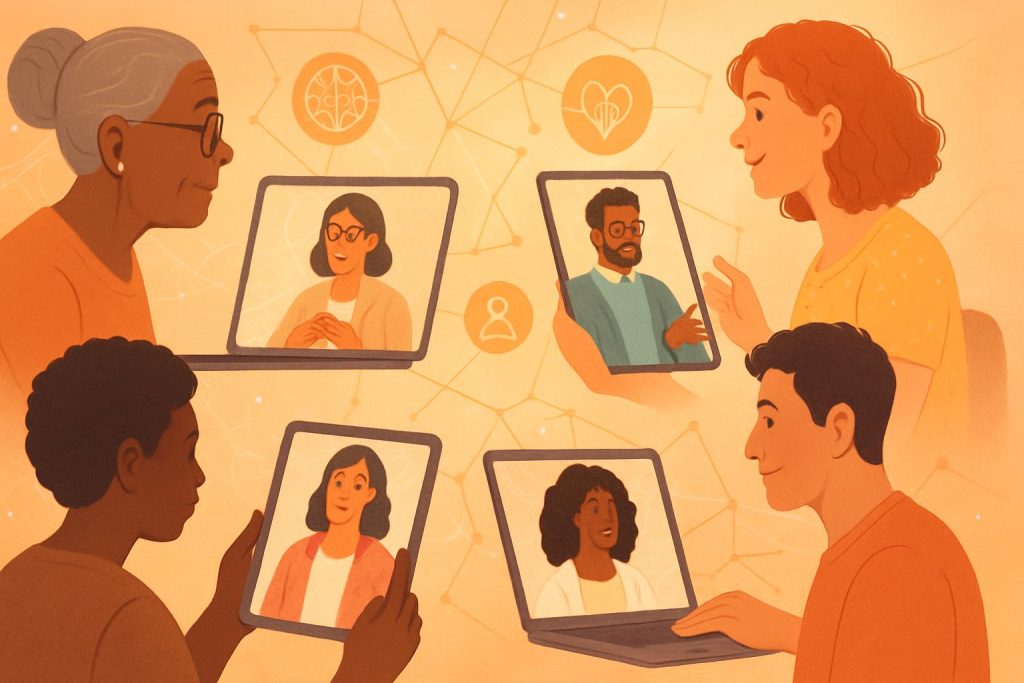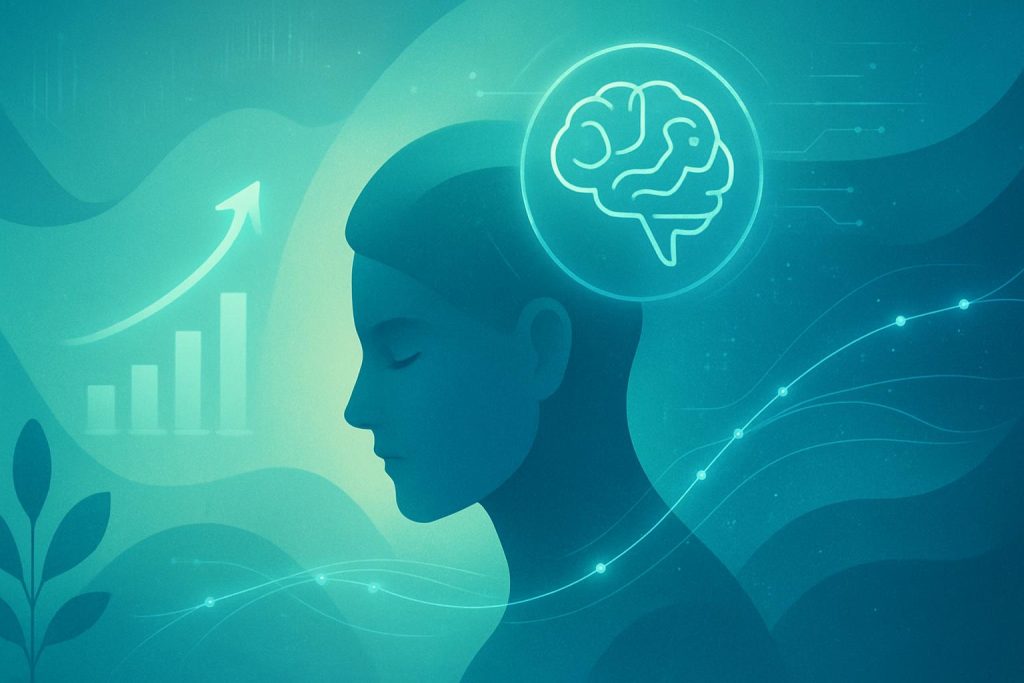Seeking professional help is a significant and often crucial step in managing mental health challenges, a cornerstone discussed in our main guide, Improving your mental health: strategies and AI tools. However, traditional in-person therapy faces numerous barriers: cost, geographical limitations, scheduling conflicts, and the persistent stigma surrounding mental health treatment can prevent many individuals from accessing the support they need.
The digital revolution, significantly accelerated by advancements in artificial intelligence (AI), has ushered in a new era of mental healthcare: online therapy platforms. These platforms leverage technology to break down traditional barriers, offering convenient, discreet, and often more affordable access to licensed therapists. AI plays a pivotal, albeit often behind-the-scenes, role in optimizing these services, particularly in the crucial process of matching clients with the right therapist, thereby enhancing the accessibility and potential effectiveness of remote mental health support. Find more in Mindfulness meditation: AI apps for calm and focus.
Online therapy, also known as teletherapy or e-therapy, encompasses a range of mental health services delivered via digital platforms, including video conferencing, phone calls, and text-based messaging. Its rise addresses a critical need for more flexible and readily available mental health resources. For individuals in remote areas, those with mobility issues, busy professionals, or those simply more comfortable seeking help from the privacy of their own home, online therapy offers an invaluable alternative. Furthermore, the ability to connect with specialists beyond one’s immediate geographical area broadens the pool of potential therapists. While the core therapeutic relationship remains paramount, technology facilitates the connection, and AI is increasingly used to make that connection more efficient and potentially more successful.
This article delves into the world of accessible online therapy, focusing on the role AI plays in connecting individuals with professional support. We will explore:
- The benefits and limitations of online therapy compared to traditional methods.
- How AI algorithms facilitate the therapist-client matching process on major platforms.
- The different modalities offered: video, phone, asynchronous messaging.
- Key considerations for choosing an online therapy platform.
- Spotlight on prominent platforms utilizing AI-enhanced matching, such as find licensed therapists online using the BetterHelp app and connect with therapists via text using the Talkspace app.
- The potential integration with data tracking tools like track mood and health data using the Welltory partner app to inform therapy.
- Ensuring privacy, security, and ethical considerations in the digital therapeutic space.
By understanding how these platforms operate and the technology underpinning them, individuals can make informed decisions about leveraging online therapy as a viable and effective means of accessing mental health support.
Bridging the gap: Advantages of online therapy
Online therapy platforms offer several compelling advantages over traditional face-to-face sessions:
- Accessibility: Overcomes geographical barriers, providing access to therapy for those in rural areas or with limited local options.
- Convenience: Sessions can be scheduled more flexibly, fitting around work, childcare, or other commitments, eliminating travel time.
- Comfort and Privacy: Receiving therapy in a familiar, private environment can reduce anxiety and stigma for some individuals.
- Wider Therapist Selection: Access to a larger pool of licensed therapists with diverse specializations, potentially across state lines (depending on licensing regulations).
- Varied Communication Modes: Offers options beyond video calls, such as phone sessions or asynchronous messaging, catering to different communication preferences and needs.
- Potential Cost-Effectiveness: Subscription models or lower overhead costs can sometimes make online therapy more affordable than traditional options, though insurance coverage varies.
Limitations and considerations
Despite the benefits, online therapy isn’t without potential drawbacks:
- Technology Dependence: Requires reliable internet access and comfort using digital devices.
- Non-Verbal Cues: Subtle body language cues can be harder to perceive via video or entirely absent in text/phone modalities.
- Crisis Management: May not be suitable for individuals experiencing acute crises requiring immediate, intensive intervention.
- Therapeutic Alliance: Some individuals may find it harder to build a strong connection with a therapist remotely.
- Privacy/Security Risks: Concerns about data breaches or confidentiality, necessitating careful platform selection.
- Licensing Issues: Therapists are typically licensed by state, which can limit options depending on the client’s location.
The role of AI in therapist matching
One of the most significant applications of AI in online therapy platforms is optimizing the therapist-client matching process. Finding the right therapist – someone with the appropriate expertise, therapeutic approach, and personality fit – is crucial for successful outcomes. AI algorithms streamline this complex task:
- Data Analysis: AI processes information provided by clients during intake (e.g., presenting issues, goals, preferences for therapist demographics or style) and data from therapist profiles (e.g., specializations, theoretical orientation, experience, availability).
- Pattern Recognition: Algorithms identify patterns and correlations that predict successful therapeutic pairings based on historical data (anonymized) from previous matches.
- Efficient Filtering: AI quickly filters through potentially thousands of therapist profiles to generate a shortlist of the most suitable candidates, saving significant time compared to manual searching.
- Personalized Recommendations: Platforms present users with a curated list of potential therapists, often explaining why a particular match is suggested based on the algorithm’s analysis.
This AI-driven approach aims to increase the likelihood of a positive therapeutic alliance from the outset, reducing trial-and-error and improving the overall user experience. Platforms like find licensed therapists online using the BetterHelp app and connect with therapists via text using the Talkspace app heavily rely on such systems.
Communication modalities: Finding your fit
Online therapy platforms typically offer several ways to communicate:
- Live Video Sessions: Most closely mimics traditional in-person therapy, allowing for real-time conversation and visual cues.
- Live Phone Sessions: Offers real-time conversation without the visual component, which some may prefer.
- Asynchronous Messaging (Text, Audio, Video): Allows clients and therapists to exchange messages at their own convenience, without needing to be online simultaneously. This provides flexibility and time for reflection but lacks the immediacy of live sessions. Platforms like Talkspace are well-known for this modality.
- Live Chat: Real-time text-based conversation.
Many platforms offer subscription plans that include a combination of these modalities.
Choosing the right platform and therapist
Selecting an online therapy service requires careful consideration:
- Licensing and Credentials: Ensure the platform only uses licensed, accredited therapists (e.g., LCSW, LPC, PhD, PsyD).
- Specializations: Does the platform have therapists specializing in your specific concerns (e.g., anxiety, trauma, relationship issues)?
- Communication Options: Choose a platform offering the modalities you feel most comfortable with.
- Matching Process: Understand how therapists are assigned or chosen. Do you get a choice?
- Cost and Insurance: Clarify subscription fees, session costs, and whether the platform accepts your insurance or provides documentation for reimbursement.
- Privacy and Security: Review the platform’s HIPAA compliance, data encryption practices, and privacy policy.
- User Reviews: Look for independent reviews, but be mindful that experiences are subjective.
Once on a platform, finding the right therapist might still take time. Don’t hesitate to request a change if the initial match doesn’t feel right.
Potential integration with data tracking
An emerging area is the potential integration of data from wellness or mood tracking apps, such as track mood and health data using the Welltory partner app, into the therapeutic process. Sharing objective data on mood patterns, sleep quality, or stress levels (with explicit user consent) could provide therapists with valuable context and insights, complementing subjective client reports. AI could potentially help analyze this data to highlight trends relevant to therapy goals, though privacy and interpretation standards are still evolving.
Technology expanding mental health access
Online therapy platforms, enhanced by AI, represent a significant step forward in making mental health support more accessible, convenient, and personalized. By leveraging algorithms for efficient therapist matching and offering diverse communication modalities, services like BetterHelp and Talkspace break down many traditional barriers to care. While online therapy may not be suitable for everyone or every situation, it provides a vital resource for millions seeking professional guidance.
As technology continues to evolve, potentially integrating more sophisticated AI analysis and data from tools like Welltory, the landscape of digital mental healthcare will likely become even more nuanced and effective. Choosing a platform wisely, understanding its capabilities and limitations, and actively engaging in the therapeutic process remain key to harnessing the benefits of this accessible approach to mental well-being, supporting the broader goal of Improving your mental health: strategies and AI tools.



